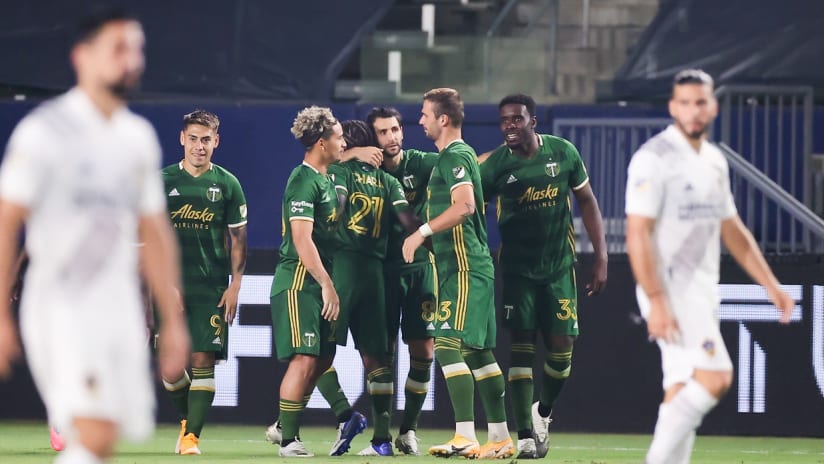BEAVERTON, Ore. – The Portland Timbers scored six times in their mid-week, 6-3, victory at the LA Galaxy. Their Sunday opponent, the visiting San Jose Earthquakes, gave up the same number of goals to Portland the last time the teams faced each other, on September 19 at Earthquakes Stadium (7pm PT, FOX 12 PLUS (KPDX)). Combine’s Portland’s form with that precedent and you have a worrying scenario for Matías Almeyda’s Earthquakes.
“San Jose is going to be very competitive,” Timbers head coach Giovanni Savarese reassured on Friday. “It is going to be very difficult. They're coming from winning a few matches. They're getting their confidence back. And this is a team that you always have to put a lot of energy, work very hard … They're going to be very difficult.
If there’s any question about how sustainable the Timbers’ attacking surge is, Sunday could provide some valuable insight. In theory, Portland should be able to put up a strong goal total against their guests. The Earthquakes have the worst defense in MLS this season, having conceded 40 times in 20 games, while the Timbers’ attack has climbed to the league’s third-highest goal total. Fourteen goals in their last four games have fueled that surge.
That factoid about the Timbers’ recent scoring may be slightly deceiving, though. In terms of goals-per-game over that span, 3.5 is undoubtedly impressive. But within that stretch have been wildly different attacking performances. Before Wednesday’s six-goal game against the Galaxy, the Timbers beat Seattle Sounders FC and Vancouver Whitecaps FC by 1-0 scores.
“Even though we scored goals [against the Galaxy], we still have the chance to be more dangerous going forward,” Savarese said. “Even though we're the second or third [in MLS in] goals scored, I think we can improve. We can get better.”
According to another Timber, focusing on goal totals misses the point. Wins and losses? The same. For goalkeeper Steve Clark, goals and wins are byproducts of a successful process, and although sports are a results-based business, those results come from making sure the underlying components are addressed first.
“I don't necessarily look at it like, 'oh, this is happening now and it wasn't happening, before,'” Clark explained. “It's a continuum. Because you score one goal and you didn't score six doesn't mean the attack was poor, I don't think, in the games before, or it wasn't firing.
“I think that the process is more important, in looking to get guys chances. Creating chances is probably what I focus on more than goals, but overall, I have a more holistic approach. If you get focused on results – how many goals you scored; how many goals against – it becomes a bit of a rollercoaster.”
With eight games left in the 2020 regular season, the process needs to stay in focus. Though the Timbers are in the race to claim the top seed in their conference, the main goal is improving, as well as making sure they’re the best team they can be when the playoffs arrive. In all likelihood, improvement will translate into wins, but those things can’t be confused. Winning is what happens when you improve. You haven’t necessarily improved because you won.
“In every area, there is something to improve,” Savarese said. “Individually, we can still continue to grow. I think that's the exciting part about the team. We still have room to grow even though the performances have been very strong and we're on a good path.
Even as the top of the West comes into view and, in terms of playoff positioning, games are becoming more important, the idea of what the Timbers can be is still the focus. Win, lose or draw, Portland’s process has to continue.












